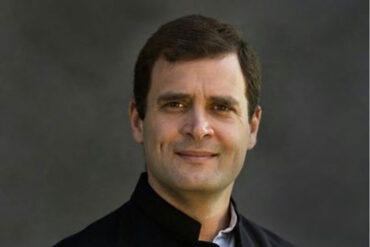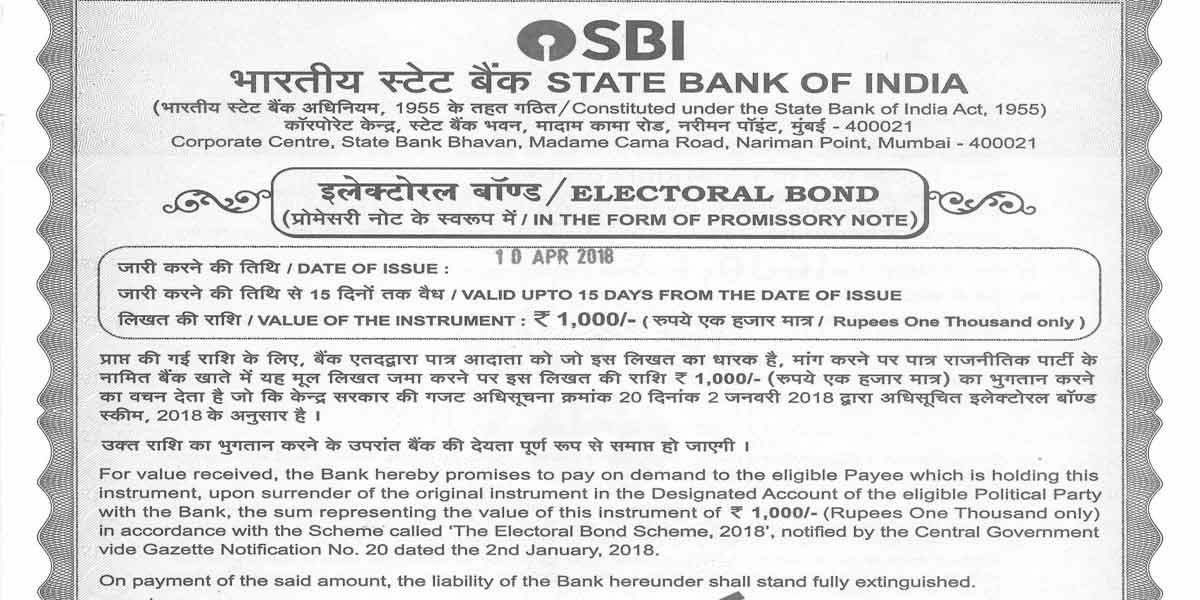The Bharatiya Janta Party is taking full advantage of the existing electoral bond scheme of the NDA government in bringing about massive expansion of its finances by cornering more than ninety per cent of the funds received under the scheme from the donors belonging mainly to the traders and the corporate houses. This scheme has given BJP, the present ruling party at the centre and in most of the states, a phenomenal advantage in influencing the course of the elections in the states and the centre.
Electoral bonds worth a total of Rs.6128 crore were sold between March 2018 to October 2019 with more than Rs3622 crore sold just before the Lok Sabha elections in May 2019 which the BJP won with ease trouncing the cash deficient Congress Party and the other opposition groups. The Supreme Court, despite a large number of petitions pending, is sitting silent and till now, there is no indication that the apex court judges have taken up the issue seriously though they have been talking about removing corruption from public life.
The Association of Democratic Rights (ADR) filed a petition in Supreme Court in March 2019 challenging the controversial scheme and ADR was followed by another petition by Common Cause and the third one was filed by the CPI (M). All three are pending and Chief Justice Ranjan Gogoi is retiring on November 17 after pronouncing verdict in some key cases including Ayodhya but the electoral bond scheme is not a part of that.
The Election Commission of India (ECI) has sharply criticised the introduction of the electoral bonds scheme. In a three-page letter written to the Ministry of Law and Justice, it opposed the view of the Central Government that the introduction of the electoral bonds would make the process of political funding and donation transparent, but neither the Government nor the Supreme Court took up the issue on priority.
The petitions have raised two key issues: Does the current electoral bond scheme facilitate unaccounted anonymous political donations by corporations? Can such a scheme be introduced through the Finance Act, as this bypasses scrutiny by the Rajya Sabha?
The controversial scheme was introduced through the Finance Act, 2016 and Finance Act, 2017 which amended four legislations – Representation of the People Act, 1951; Income Tax Act, 1961; Foreign Contribution Regulation Act, 2010; and Companies Act, 2013.
On April 12, a three-judge bench comprising of the Chief Justice of India Ranjan Gogoi and Justices Deepak Gupta and Sanjiv Khanna refused to stay the operation of the scheme. However, as an interim measure, it directed all political parties to provide the ECI in a sealed envelope, details of donors who contributed through electoral bonds as well as the amount received from them until May 15. This information was to have been furnished to the ECI latest by May 31, 2019, meaning that by that time Lok Sabha elections would be over and the BJP was unhindered in taking full facility from the scheme.
An electoral bond is like a Promissory Note, similar to a banknote, that is payable to the bearer on demand and free of interest. It can be purchased by any Indian citizen or a body corporate in India. An electoral bond may be issued in multiples of Rs 1,000, Rs 10,000, Rs 1 lakh and Rs 1 crore and are available at specified branches of the State Bank of India. A donor can purchase an electoral bond with a KYC-compliant account and can donate the bonds to their party of choice, which can then be cashed through the party’s verified account within 15 days. Any political party that is registered under Section 29 A of the Representation of People Act, 1951, and has secured not less than 1 per cent of the votes polled in the last elections to the Lok Sabha or legislative assembly will be eligible to receive electoral bonds.
To exempt political parties from disclosing the donations received through electoral bonds is basically providing a single window opportunity to corporates to just flush the parties with money, and influence policy decisions. It is well-known which parties receive thousands of crores of money in donation, and can spend 5000 crore on election funding. The electoral bonds scheme is a completely opaque system, designed to favour the ruling party by the corporates.
The Supreme Court ought to have given priority to this issue as it involves the core of the operation of our electoral system. The Election Commission itself cast its doubt on the transparency of the donations. But the bond scheme has continued giving the BJP disproportionate advantage in spending funds in the elections for grabbing power.
(By arrangement with IPA)







